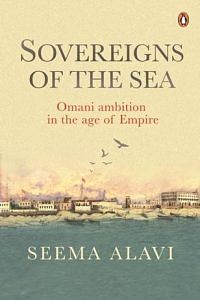Sayyid Majid had no coinage of his own. He was dependent upon all the powers who had jurisdiction in Zanzibar for the money that circulated in his dominions. His polity depended also on Indian capital invested by the Kutchis and Banias. He welcomed Kutchis, as they were critical to his slave-driven economy. The Kutchis, unlike the British Indian subjects, were exempt from the ban on slave trade as they technically came from the protected territory of Kutch ruled by their Rao. This was of huge benefit to Majid. He was compelled to emancipate slaves held by British Indian subjects when pressured by the Consul. But he was under no such compulsion with regard to the Kutchis. In fact, he justified the Kutchi involvement in slave trade as legitimate and legal because of their legal exemption from the prohibition.
The Kutchis were subjects of the Rao of Kutch—an independent princely state in India. They were exempt from the provisions of anti-slave trade treaties that covered only British Indian subjects. This was good news for them, as their involvement with this trade went back to the 1830s. From this early period, a considerable amount of slave traffic was carried on between the dominions of the Sultan of Muscat, the Arab ports of the Persian Gulf and the ports of Kutch and Kathiawar. Most of this trade was of children slaves, both boys and girls. Measures adopted by the British agent failed to put a stop to this traffic.
However, not being British subjects did not mean that they hesitated in leaning on British help when required. They borrowed money from each other to carry on their business in Zanzibar and, in case of any delay or backtracking of promises, they sought help from the Consulate office. For instance, in 1863, a Kutchi petitioner named Khakar Damodaran Devji, who traded in elephant ivory and European piece goods since 1851, had to close his business on the island as his credit was badly affected. He returned to Bombay, suffering a loss of $1000. One important reason for his return was that a fellow Kutchi, Mamula Mulji, pursued his claim for a certain sum of money that Devji owed him. Mulji applied to Pelly, the British Consul, for help in getting his money back. Not receiving too much help from Pelly, Mulji renewed his application to Mr Witt, a Dutch gentleman, who was placed at the embassy in the absence of Pelly. Witt came to Devji’s warehouse and shop and, on not getting the payment, he threw his things on the street, saying he would auction them for the satisfaction of the debt.
Also read: ‘Did the Chinese beat you?’ A Tibetan writer has an answer to this old question in Dharamshala
Devji petitioned to the Bombay government, arguing that his reputation and prestige as a merchant were damaged and that the extreme action was prejudicial to his credit. He argued that when he threatened Witt with a complaint to the Government of Britain, he was arrested. Devji alleged that he was confined for six hours on the request of Witt. He was released only after paying $200 in satisfaction of the said debt. Devji urged the Bombay government to help him get back the $200 and the said security to be cancelled. Further, he wanted a payment of $1000 as cost of damage sustained by him in consequence of the actions of Mr Witt. His pleas went unanswered, as the Bombay government stood by Mr Witt.
The Kutchi dabbling in slaves was such a nuisance that the Bombay government invariably sought clarifications from the Government of India on the extent of their interference to curtail the practice. This was not easy, as the Kutchis were technically not British subjects. Indeed, their exclusion from British treaties banning slave trade was so handy for them that they did not opt to register themselves as British subjects in the Consulate Register. Not surprisingly, British Consuls in Zanzibar, such as Pelly and Churchill, accused Rigby of leaving them uncovered in the treaties he had signed on this issue with Majid. This lapse resulted in many Kutchis also opting to register themselves as Sayyid Majid’s subjects when the choice was offered to them by the British Consul Playfair. As Majid’s subjects, they were exempt from slave trade prohibitions. As we saw above, the restrictions of slave trafficking applied only to British subjects.
Majid was quick to play on the Kutchi drift towards him. He always invoked the word of Consul Playfair, who emphasized that the law against trafficking of slaves was only applicable to those
British subjects documented in the Consular Register. All others were exempted. Majid further interpreted this to his advantage and argued that in accordance to this order, all Indians who had not opted to register as British subjects or avail protection by enlisting in the register were to be considered Arab. He reiterated Playfair’s words, ‘that all [Indian subjects] such as had not yet entered their names in the Consular register that he had sent us should be considered as Arabs, and that those alone who had caused their names to be written in the book were under British protection’.
Also read: How Karnataka’s Jogathis find feminine power, dignity through Goddess Yellama
Majid clarified further that such Arabs by default were also his subjects and under his legal jurisdiction. Offering himself as the patron and master of all the non-British subjects involved in slave traffic, he became a huge attraction for the Kutchi slave dealers, who looked to him for furthering their business. He regularly invoked Playfair, who said, ‘all such who had not entered their names in the Consular register [be] as assimilated to that of the Arabs in reference to jurisdiction, and at liberty to buy slaves etc.’. Majid underlined the fact that the status of all those Indians not in the Consular Register was ‘assimilated by Col Playfair . . . to that of the Arabs, having being abandoned to our jurisdiction’. He concluded that as per Playfair’s orders, Kutchis had committed no crime in possessing slaves.
Majid used to his benefit the issue of choice in subject status, that the British had introduced, to further his political agenda and consolidate his social and economic base. Hugely dependent on Indian capital for his lucrative slave trade, he stretched his long arm farther to embrace other Indian merchants who were party to this traffic. They were attracted to him, as they could escape British restrictions on slave trade by availing of the option to switch subject status and come under his protection. He clarified that there were many other natives of India who were in his service, and many of them had been born in Zanzibar, some even fifty years back. He said, ‘we look upon these and their children as our subjects the Arabs’.
Majid’s claim over certain categories of Indians as his subjects was threatening to the British, as it cast his political sovereignty in an alarmingly embracive way. They soon came up with caveats to the option of subjecthood by choice. The Bombay government was resolute that British subjects residing in Zanzibar could not exempt themselves from British law by taking service with the Sultan or claiming his protection. It asked the Government of India for its legal opinion. And the government stated in no uncertain terms that the Rao of Kutch in 1836 had entered into a treaty with the British, recognizing its paramount power, and that a British agent resided there. Thus Kutchis could not be exempt from British law and rules of slavery when in foreign lands only because they had not registered in the register of the Consul as British subjects.
 This excerpt from Seema Alavi’s ‘Sovereigns of the Sea: Omani Ambition in the Age of Empire’ has been published with permission from Penguin India.
This excerpt from Seema Alavi’s ‘Sovereigns of the Sea: Omani Ambition in the Age of Empire’ has been published with permission from Penguin India.



